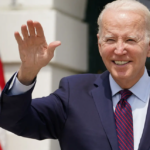
This article was first published in the New York Post on April 29, 2023. Click Here to read the original article.
President Joe Biden’s announcement that he will seek a second term combined with Donald Trump’s surging effort to secure his third consecutive Republican nomination guarantee one thing for sure.
Their combined failures in Afghanistan, both the catastrophic strategic consequences of US and NATO withdrawal and the humiliating operational mishandling of the departure itself, should be key issues for their opponents in 2024’s campaign.
Trump’s view of his abilities as a great dealmaker is central to his case for being president.
He repeatedly emphasizes this inflated view of himself — and thereby his blindness to international realities — most recently by asserting he could resolve Russia’s aggression against Ukraine in 24 hours if he could just get Russian President Vladimir Putin and Ukrainian President Volodymyr Zelensky in a room together. Trump’s acolytes unfortunately accept his boasting at face value.
More knowledgeable observers understand that Trump’s views are fantasy.
They simply ignore what he says as “Trump being Trump,” missing, however, that the former president’s rhetoric is not just hot air.
His 24-hour mantra about Ukraine, for example, in fact shows he doesn’t grasp the complexities of that or almost any other national-security issue.
Trump proceeds on his often-stated belief that facts and subject-matter knowledge generally are unimportant compared to the personal relationships he can establish with foreign leaders, especially those who are America’s adversaries.
With Putin, China’s Xi Jinping, North Korea’s Kim Jong Un and Turkey’s Recep Erdogan, Trump claims that his interpersonal skills are such that he can separate these hard-headed authoritarians from their own national interests and achieve outcomes favorable to the United States.
Of course, the former president has little to no understanding of what America’s national interests are, basing his judgments instead on what is best for Donald J. Trump.
His unilateral diplomacy with the Taliban excluded the legitimate Afghan government Washington spent 20 years trying to nurture.
The widespread knowledge inside Afghanistan that Trump was negotiating solely with the terrorists convinced people that he was determined to withdraw no matter what the Taliban actually agreed to — he was merely seeking cover for departing unilaterally.
Biden is equally culpable. As newly inaugurated president, Biden had every right to reject Trump’s fatally flawed agreement, which the Taliban had already violated even before the ink was dry.
At a minimum, Biden could have taken more time to evaluate the deal and its implementation.
Indeed, Biden did order a short extension of the withdrawal of US and NATO forces and could have done much more.
The widespread perception that Biden agreed with Trump on exiting, heedless of the risks and costs not just to Afghanistan but to America, discredited and demoralized both Kabul’s civilian government and the Afghan National Army.
It was no surprise when both the government and its military collapsed so quickly. They knew they had no chance of survival over the long term, especially since neither US president thought seriously of holding the Taliban to its commitments and reversing the withdrawal in the absence of scrupulous Taliban compliance.
It was therefore entirely predictable that the Taliban’s return to power would produce a flood of foreign terrorist fighters back to Afghanistan’s remote and inhospitable territory, establishing bases from which they could plot new terrorist attacks worldwide.
Among the classified documents compromised in the still-growing “Discord” intelligence scandal are Pentagon analyses of ISIS-Khorasan activities in-country and evidence of the scope of, and preparations for, their possible global threats.
This is not the first time Biden administration officials have concluded terrorists were returning to Taliban-controlled Afghanistan in significant numbers.
In public congressional testimony just months after the withdrawal (and subsequently), the Defense Department conceded that both al Qaeda and ISIS were rapidly recreating the capability to launch terrorist attacks from Afghanistan against America.
While the Taliban has now reportedly killed the ISIS leader responsible for the murderous attacks at Kabul’s airport during the chaotic withdrawal effort, ISIS remains formidable, as does al Qaeda, still closely linked to the Taliban.
In the potentially tragic case of a terrorist attack against the United States in the 18 months until the 2024 elections, Americans will know who to blame if Trump, Biden or both receive their respective parties’ nominations.
They have fully proven their incompetence in dealing with the Taliban.
We can only hope to avoid further proof in the form of additional US casualties. But if we don’t, our fellow citizens’ verdict will not be hard to predict.